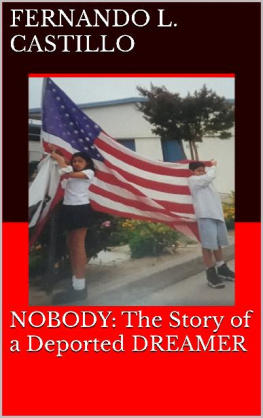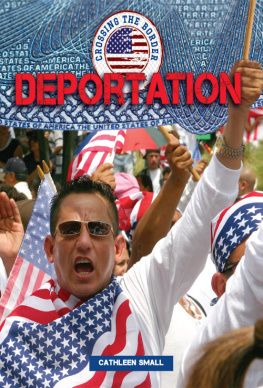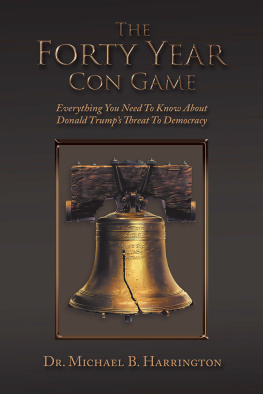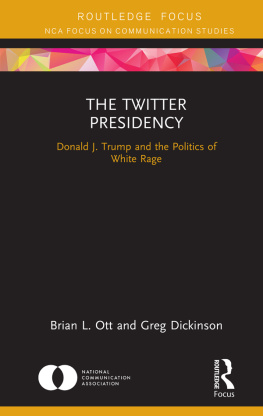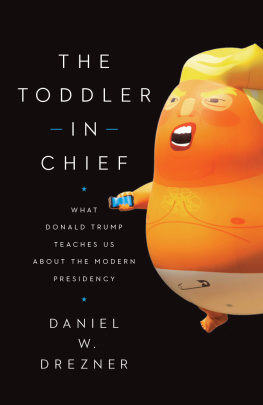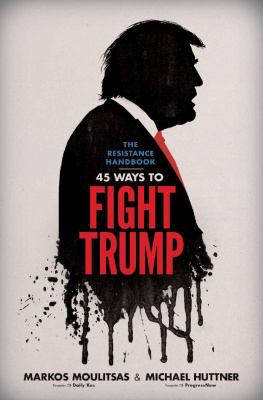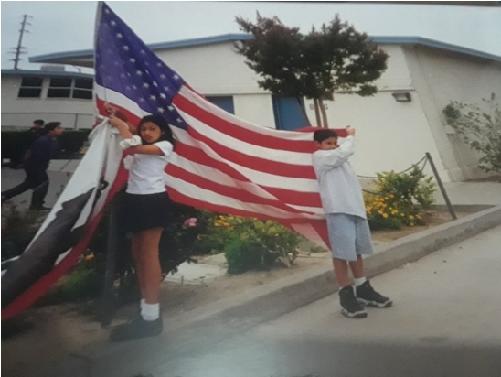NOBODY
NOBODY:
The story of a deported DREAMER
BY: Fernando Leopoldo Castillo Soto
This book is dedicated to
Oppressed people everywhere
and
to my immediate family
who has always supported me from afar
Contents
Notes on terminology 5
Introduction 15
Chapter 1: Growing up undocumented 32
Chapter 2: A PUNK ROC K ballad 68
Chapter 3: Back to school 99
Chapter 4: Left out of paradise 148
Chapter 5: Deported 184
Chapter 6: Life After Deportation 240
Epilogue 279
Recommended Social Justice books 285
NOTES 290
Notes on terminology
Malinchista: The term Malinchista is more so used in Mexico than it is in the United States and is a term used to refer to people living in Mexico who tend to favor foreigners over their own people often times by selling out their own country for their own personal interest favoring everything that is foreign instead of their own heritage. The term Malinchista is also a term used to refer to Mexicans who betray the Mexican people and comes from the name Malinche whom was the name of an indigenous woman given to Hernan Cortez as a slave. La Malinche was an incredibly intelligent woman who knew numerous native languages and learned to speak Spanish very quickly. Eventually La Malinche dominated the Spanish language and replaced Gernimo de Aguilar as Hernan Cortez translator. La Malinche was tantamount to Hernan Cortes and vital for the defeat of the Aztec empire as she was the one who convinced enemies of the Aztec to join Hernan Cortez during the conquest of Mexico. In the modern day some people have attempted to give La Malinche justice given that she was a victim of circumstances because she was a slave and an indigenous woman who did not belong to the Aztec empire therefore she did not owe them her loyalty. The defeat of the Aztec is a tragic story in Mexican history but their defeat was also attributed to warring tribes and indigenous groups that hated the Aztec and sided with the conquistadors instead of the Aztec given that the Aztec themselves were once an oppressive group towards smaller lesser known indigenous nations in Mexico. Love her or hate her La Malinche remains to this day in Mexican history a rather controversial figure praised by some as the mother of the Mestizaje who gave birth to the first Mestizo Martin Cortez which was Hernan Cortez mixed race son and whom paved the way to modern day Mexico. On the other hand, when it comes to Mexicans who favor Indigeneity over Meztizaje she is hated and even despised given that she was vital for the defeat of the Aztec empire and whom without her contributions the Spanish would have never been able to enter Tenochtitlan and conquer the Aztec with ease. Many Mexican scholars who are in defense of La Malinche will say that the term Malinchista is outdated, inaccurate, and attempts to discredit the contributions to Mexican society that came from an indigenous woman by vilifying her name. Nevertheless, La Malinche remains an enigma and controversy to the Mexican people.
Coconut/Vendido/Whitewashed: Similarly, to the word Malichista in Mexico in the United States the Mexican American community have a similar word to refer to Mexican Americans who reject their Mexican heritage favoring Anglo American values and culture over their own. The term coconut for instance when a Chicano calls a Mexican American or Mexican a coconut they are not referring to the delicious tropical fruit if not a Mexican who is brown on the outside but white on the inside like a coconut. Whereas vendido is like saying traitor and is the Spanish word for sellout as in a Mexican American who sells out their own people such as when Mexican Americans oppose immigration, hate Mexico, Mexican culture and identify as American in place of Mexican American or Chicano. Whitewashed and coconut go hand in hand as it is basically a Mexican who acts white or wants to be white often times by rejecting or feeling ashamed of their Mexican ancestry as a result of internalized racism and self-hate which exists in the United States among the Latino community because of the legacy of white supremacy in the country yet often times Mexican Americans whom feel this way is because they know very little about their own history.
Mestizaje/Religious syncretism: Mestizaje is the Spanish word for miscegenation which means the interbreeding and reproduction of members of a different race which to put it shortly basically means race mixing. However, in Mexico mestizaje is not limited to the biological mixing of different races if not is also a cultural phenomenon such as traditional Mexican culture which is a blend of European, Indigenous, African, and even Arabic traditions. Much different than indigenous traditions many of whom do not have any outside influences. Religious syncretism is also a type of mestizaje in that it is the blend of Indigenous, African, and European spiritual and religious beliefs found throughout Latin America. An example of religious syncretism is found in the Mexican tradition known as day of the dead which is a blend of Indigenous and Spanish beliefs such as the offerings placed to the dead which comes from the Aztec and the Spanish beliefs of Catholicism which was later blended with the traditions of indigenous Mexicans. Similarly, in the Caribbean Santeria is a blend of African and European spiritual beliefs who were only able to be kept alive by indigenous and African people in Latin American countries through the blending of cultures because of the persecution they once faced for practicing their ancient beliefs in the Americas which led to religious syncretism and allowed for many of their traditions to survive.
Indigenismo/Indigeneity: Indigenismo is Spanish for Indigeneity which is a word defined as being the original inhabitants of the Americas whether it be Native Americans in the United States or Indigenous peoples from Canada and Latin America. Indigeneity to many indigenous people in the American continent both Northern and Southern hemisphere is empowering to the first nation peoples of the Americas and is often times used as a way to reject settler colonialism and racism by the descendants of native people by embracing who they are rather than assimilating to white Anglo society.
Mexican national: A Mexican national is a citizen of Mexico residing in his country of origin tierra Azteca.
Dreamer: An undocumented immigrant born in another country but raised his entire life or the majority of his life in the United States and is often times assimilated to American society in the same way as U.S. born citizens.
Mestizo: A person of Indigenous and European ancestry. The word Mestizo is more commonly used among people of Mexican descent than Native Americans and Chicanos in the United States whom often times may take offense to the word and completely reject such notions as to what was written by Jose Vasconcelos during the 19th century he is the author of the Cosmic Race which promoted miscegenation in Latin America but at the same time attempted to replace Indigenous peoples in Mexico through race mixing in his philosophy. In the United States Racist American boarding schools attempted to do something similar however it was not through miscegenation which is taboo in many racist Anglo American circles if not through the indoctrination of Native Americans into white society. Brigadier General Richard Henry Pratt was an American general and founder of Carlisle Indian Industrial School. Pratt is best known for the abuses toward Native Americans and coining the phrase "kill the Indian, save the man" in his attempts to Americanize Native Americans. In the United States mestizos often times reject their white ancestry and will identify more with their indigenous heritage as result of this history of racism towards Mexicans in the United States. In Mexico however mestizos will often times reject both their indigenous and European ancestry such as what was phrased by Octavio Paz in his book the Labyrinth of solitude which gave a historically accurate depiction and critique of Mexican society.

